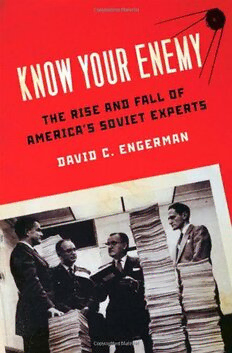
Know Your Enemy: The Rise and Fall of America's Soviet Experts PDF
472 Pages·2009·3.415 MB·English
Most books are stored in the elastic cloud where traffic is expensive. For this reason, we have a limit on daily download.
Preview Know Your Enemy: The Rise and Fall of America's Soviet Experts
Description:
As World War II ended, few Americans in government or universities knew much about the Soviet Union. As David Engerman shows in this book, a network of scholars, soldiers, spies, and philanthropists created an enterprise known as Soviet Studies to fill in this dangerous gap in American knowledge. This group brought together some of the nation's best minds from the left, right, and center, colorful and controversial individuals ranging from George Kennan to Margaret Mead to Zbigniew Brzezinski, not to mention historians Sheila Fitzpatrick and Richard Pipes. Together they created the knowledge that helped fight the Cold War and define Cold War thought. Soviet Studies became a vibrant intellectual enterprise, studying not just the Soviet threat, but Soviet society and culture at a time when many said that these were contradictions in terms, as well as Russian history and literature. And this broad network, Engerman argues, forever changed the relationship between the government and academe, connecting the Pentagon with the ivory tower in ways that still matter today.
See more
The list of books you might like
Most books are stored in the elastic cloud where traffic is expensive. For this reason, we have a limit on daily download.
